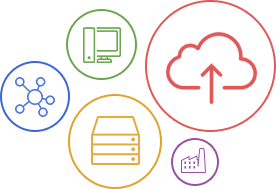It's easy to mistake "help desk" and "IT support" as synonymous terms within the tech industry. However, each plays a unique role in the technological infrastructure of a business, especially when it comes to minimizing costly tech-related interruptions.
For instance, a study by ITIC reveals that 98% of organizations report that a single hour of downtime costs over $100,000. This substantial financial burden underscores the importance of rapid and competent IT support services.
As Emil Isanov, CEO and Founder of ETech7 says, “Comprehensive IT support transforms technological challenges into opportunities for growth and improvement.”
Recognizing these differences ensures businesses can better prepare to tackle diverse technological challenges.
What is a Help Desk?
A help desk is the frontline of customer interaction for technical issues, focusing primarily on user support and quick fixes. It's designed to handle a high volume of inquiries, providing fast and efficient resolutions to common problems that users face.
Typically, the help desk is the first point of contact within a company when technical problems arise. It aims to resolve simple issues or escalate more complex situations to specialized IT support teams.
Key functions of a help desk include:
- Managing and responding to tickets in a timely manner
- Providing user guidance and troubleshooting for basic problems
- Routing more complex issues to appropriate IT support personnel
- Maintaining a customer-centric approach to enhance user satisfaction
Need Faster Resolution to Common Tech Problems?
What is IT Support?
IT support, or technical support delves deeper into technical issues that require specialized knowledge beyond initial troubleshooting. It includes both on-site and remote support.
This service involves a more detailed examination of problems and often deals with software, hardware, and network troubleshooting that help desks typically do not handle. IT support technicians possess a broad range of technical skills and deep knowledge of company-specific systems.
Their primary responsibilities include:
- Diagnosing and resolving complex technical issues
- Implementing and managing network operations
- Upgrading and maintaining hardware and software systems
- Providing detailed technical advice and support to users
IT Support vs Help Desk: Key Differences Explained
Understanding the operational roles of IT support and help desks can significantly impact how a business manages its technical support structure. Here are the key differences:
- Scope of Service: The help desk aims to resolve quick, surface-level issues that do not require in-depth technical expertise. In contrast, IT support tackles more complex problems that involve system-wide troubleshooting and detailed technical assistance.
- Technical Expertise: Compared to help desk personnel, IT support technicians typically have higher qualifications and receive more extensive training. This advanced knowledge is crucial for addressing complex issues that extend beyond initial fixes and user guidance.
- Responsiveness vs. Resolution: Help desks prioritize rapid response to maximize the number of issues resolved quickly, often using pre-defined scripts and processes. IT support, however, focuses on thorough, sometimes time-consuming, problem-solving strategies to ensure long-term solutions.
- User Interaction: Help desk interactions are usually brief and highly structured to manage large volumes of calls or messages efficiently. IT support interactions tend to be more detailed and personalized, involving deeper communication with users to resolve issues thoroughly.
- Tools and Technologies: Help desks often utilize basic troubleshooting tools and ticketing systems to manage queries efficiently. IT support requires more sophisticated tools, including advanced diagnostic software, network management applications, and remote access tools to address technical needs effectively.
Help Desk vs IT Support: A Glimpse
|
Feature |
Help Desk |
IT Support |
|
Main Objective |
Resolve common, straightforward issues quickly. |
Address complex system problems requiring specialized knowledge. |
|
Responsibilities |
- Issue logging and tracking - Initial issue diagnosis - Password resets - Handling user queries |
- System recovery and backups - Network management and security - Hardware and software upgrades - Advanced troubleshooting |
|
Tools Used |
- Ticketing systems - Basic diagnostic tools - Live chat and phone support systems |
- Remote desktop tools - Advanced diagnostic programs - Network monitoring software - Database management systems |
|
User Interaction |
High volume, low complexity interactions. |
Lower volume, high complexity interactions. |
|
Training Required |
Basic technical and customer service training. |
Advanced technical training in specific areas such as networks, databases, and hardware. |
Importance of Help Desk
- First Line of Defense: Quickly addresses common user issues, preventing them from escalating into more significant problems.
- Enhances Productivity: Research shows that a significant 86% of service teams acknowledge that implementing a help desk system boosts their productivity.
- Improves User Satisfaction: Offers a direct point of contact for users, fostering a positive experience and quick resolutions.
- Cost-Effective: Efficiently manages a high volume of inquiries, which helps reduce operational costs.
|
More resources you might like: |
Importance of IT Support
- Handles Complex Issues: Provides expertise for resolving in-depth technical problems that cannot be managed by help desk personnel.
- Ensures System Integrity: Plays a critical role in maintaining the security and functionality of IT systems.
- Supports Business Growth: Enables more sophisticated IT capabilities, which are essential as businesses grow and evolve.
- Strategic Resource Allocation: Allows companies to allocate technical resources more effectively, ensuring that expert assistance is available for serious issues.
Empower Your Business with Etech7’s Expert IT Support
Navigating the nuances between help desk and IT support is not just about terminology—it's about ensuring your business can continue to operate smoothly without unnecessary disruptions. Whether dealing with routine inquiries or complex system failures, understanding these differences is crucial.
For businesses looking to enhance their technical operations, Etech7 offers both responsive help desk support and expert IT support. Interested in strengthening your technical backbone?
|
Discover Our Trusted IT Support & Helpdesk Services Near You: |
Contact us today to schedule a free consultation and see how our tailored IT solutions can help your business thrive.














